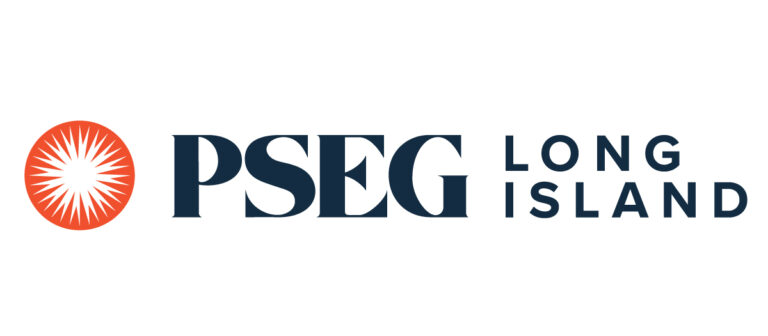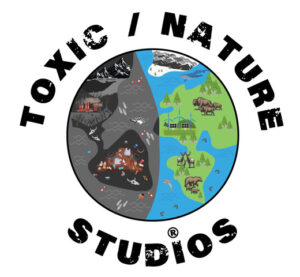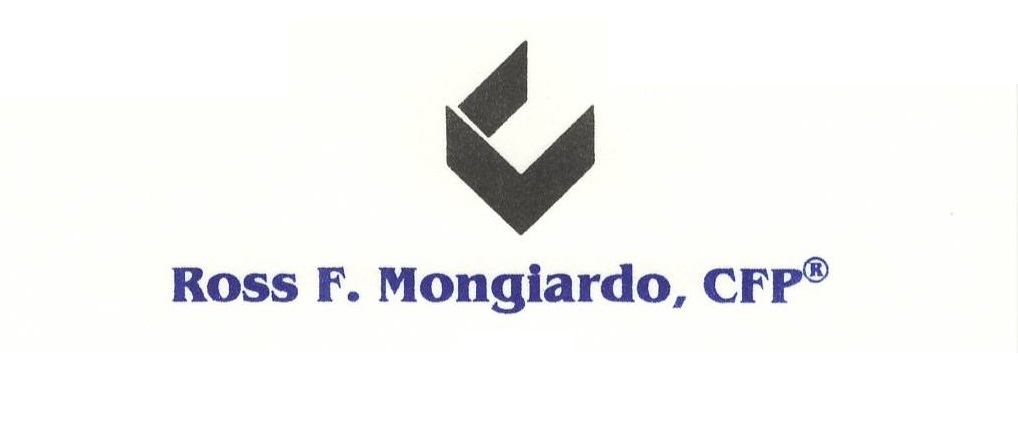Long Island
Natural History
Conference
The 2024 Long Island Natural History Conference was held on April 12 and 13 at the Brookhaven National Laboratory in Upton, NY.
Details about the 2025 conference will be announced in late 2024.
In the meantime, all presentations from the 2024 event are posted below and are included in the full collection of conference presentations in our LINHC Video Library.

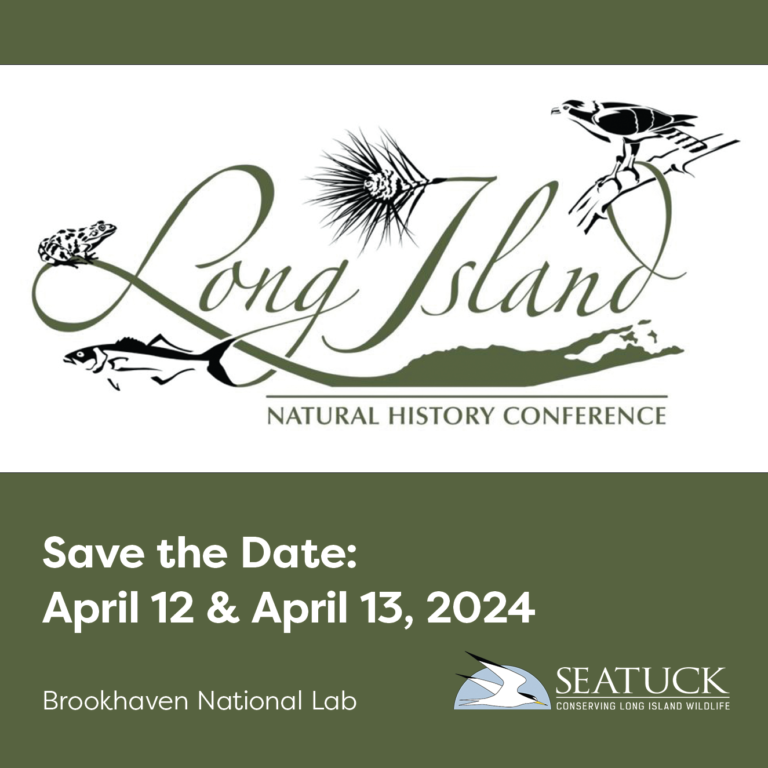
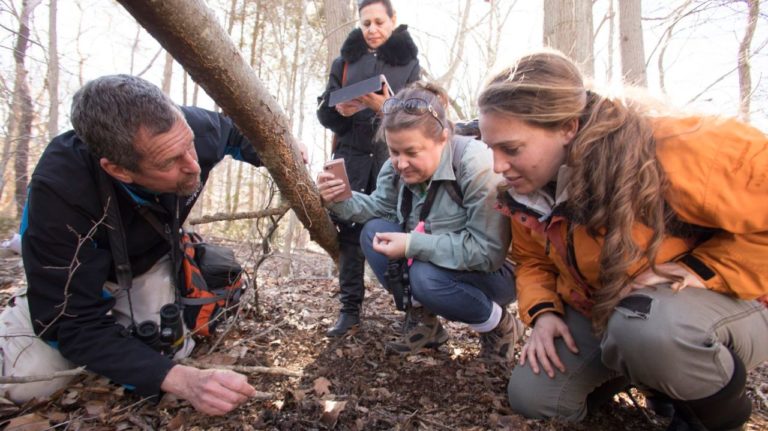
About the Conference
The Long Island Natural History Conference is the largest regional forum for the exchange of information about Long Island’s natural history. The annual event brings together Long Island’s leading naturalists to exchange current information, identifies research and management needs, and encourages collaborations and a greater region-wide interest in Long Island’s natural history.
The Conference was established by the Long Island Nature Organization (LINO) in 2012 to support education and research about the natural history of Long Island. The conference resulted from the vision and dedication of Mike Bottini, Tim Green, John Turner and the late James Monaco.
The conference was founded with the following goals:
- Introduce people doing field research, natural resource management, and conservation projects on Long Island
- Exchange current information on the natural history of Long Island
- Identify research and management needs
- Foster friendships and collegial relationships
- Encourage a greater region-wide interest in Long Island’s natural history.
Seatuck assumed management of the Long Island Natural History Conference following its merger with LINO in 2020.
2024 Conference Schedule
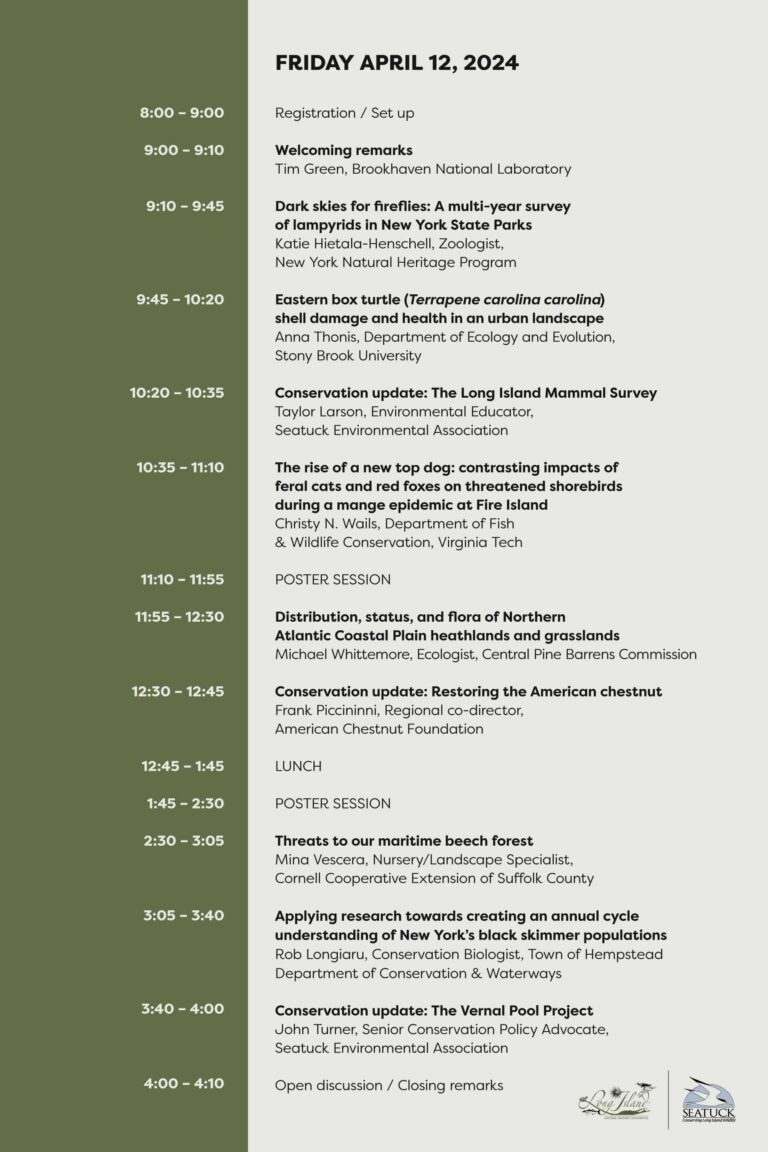
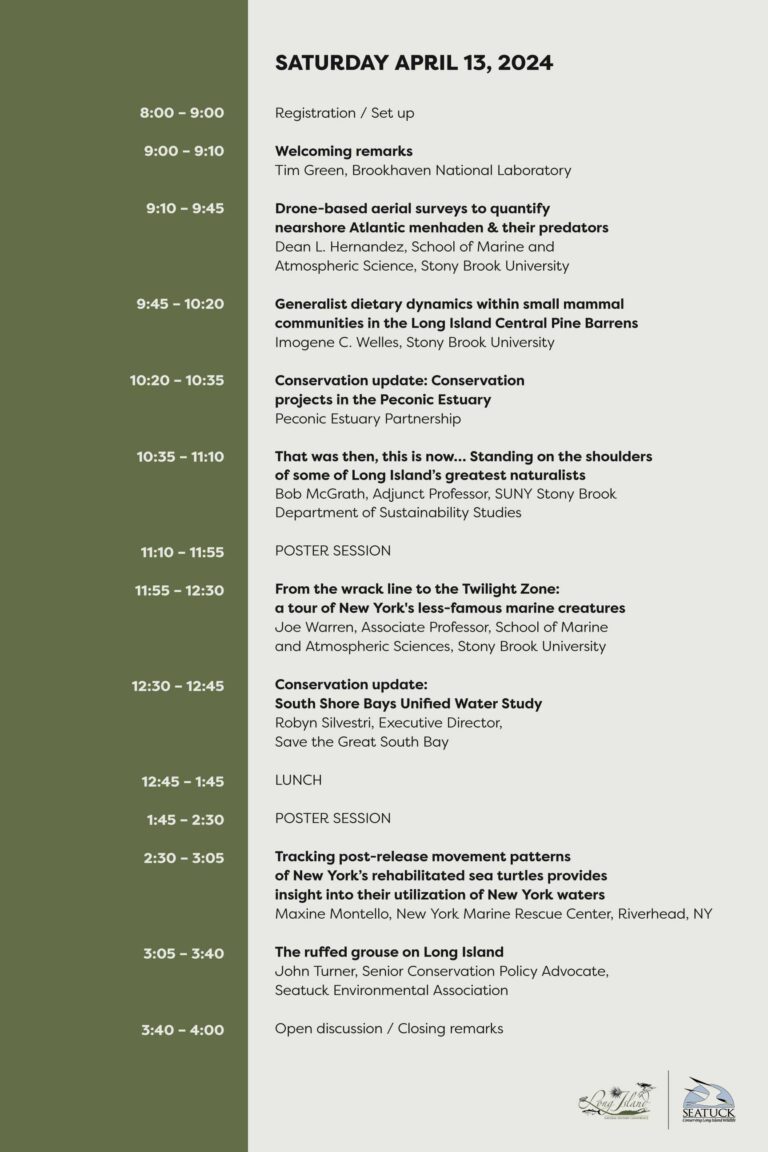
Featured Presentations
Anna Thonis, Department of Ecology and Evolution, Stony Brook University Eastern box turtle (Terrapene carolina carolina) shell damage and health in an urban landscape
Bob McGrath, Adjunct Professor, SUNY Stony Brook Department of Sustainability Studies That was then, this is now… Standing on the shoulders of some of Long Island’s greatest naturalists
Christy N. Wails, Department of Fish and Wildlife Conservation, Virginia Tech The rise of a new top dog: contrasting impacts of feral cats and red foxes on threatened shorebirds during a mange epidemic at Fire Island
Dean L. Hernandez, School of Marine and Atmospheric Science, Stony Brook University Drone-based aerial surveys to quantify nearshore Atlantic menhaden & their predators
Frank Piccininni, Regional co-director, American Chestnut Foundation Conservation update: Restoring the American chestnut
Imogene C. Welles, Stony Brook University Generalist dietary dynamics within small mammal communities in the Long Island Central Pine Barrens
Joe Warren, Associate Professor, School of Marine and Atmospheric Sciences, Stony Brook University From the wrack line to the Twilight Zone: a tour of New York’s less-famous marine creatures
John Turner, Senior Conservation Policy Advocate, Seatuck Environmental Association The ruffed grouse on Long Island; Conservation update: The Vernal Pool Project
Joyce Novak, Executive Director, Peconic Estuary Partnership Conservation update: Conservation projects in the Peconic Estuary
Katie Hietala-Henschell, Zoologist, New York Natural Heritage Program Dark skies for fireflies: A multi-year survey of lampyrids in New York State Parks
Maxine Montello, New York Marine Rescue Center, Riverhead, NY Tracking post-release movement patterns of New York’s rehabilitated sea turtles provides insight into their utilization of New York waters
Michael Whittemore, Ecologist, Central Pine Barrens Commission Distribution, status, and flora of Northern Atlantic Coastal Plain heathlands and grasslands
Mina Vescera, Nursery/Landscape Specialist, Cornell Cooperative Extension of Suffolk County Threats to our maritime beech forest
Rob Longiaru, Conservation Biologist, Town of Hempstead Department of Conservation & Waterways Applying research towards creating an annual cycle understanding of New York’s black skimmer populations
Robyn Silvestri, Executive Director, Save the Great South Bay Conservation update: South Shore Bays Unified Water Study
Taylor Larson, Environmental Educator, Seatuck Environmental Association Conservation update: The Long Island Mammal Survey
Call for Poster Submissions!
Are you conducting local research on Wildlife, Botany, Fungi, Geology, Paleontology, Hydrology, Climate, Ecology, Conservation, Invasive species, Pollution, Green space, or related topics in Kings, Queens, Nassau, or Suffolk counties?
We are pleased to invite researchers who work on any aspect of Long Island (Kings, Queens, Nassau, & Suffolk counties) Natural History to present posters on their research.
Poster abstracts need to be submitted no later than March 31. All abstracts must be reviewed in advance. Approved student presenters will have their conference registration fee waived.
Thank you to our Nonprofit Partners Nonprofit partnership includes 4 tickets & opportunity to table at the conference
CERCOM: Center for Environmental Research and Coastal Ocean Monitoring, at Molloy University
Coastal Steward Long Island
CRESLI: Coastal Research and Education Society of Long Island
Eastern Long Island Audubon Society
FOREST: Foundation for Research and Stewardship in the Long Island Pine Barrens Maritime Reserve
Four Harbors Audubon Society
Friends of the Long Pond Greenbelt
Friends of Wertheim NWR
Huntington-Oyster Bay Audubon Society
Long Island Conservancy
Long Island Pine Barrens Society
New York Flora Association
New York State Marine Education Association
North Fork Audubon Society
NY Marine Rescue Center
Peconic Baykeeper
Peconic Estuary Partnership
Peconic Land Trust
Save The Great South Bay, Inc.
Sisters of St. Joseph
South Fork Natural History Museum
South Fork Sea Farmers
Southampton Trails Preservation Society
Surfrider Foundation Eastern Long Island Chapter
The Nature Conservancy
The Sierra Club Foundation
2023 LINHC PRESENTATIONS
Long Island Terrestrial Mammal Survey: How to get involved
Arielle Santos, Conservation Scientist
Seatuck Environmental Association
Assessing salt marsh health on Long Island
Nicole Maher, Ph.D, Senior Coastal Scientist
The Nature Conservancy
The flora and fauna of Fischers Island
Terrence McNamara
H.L. Furgerson Museum, Fishers Island
Disappearing southern New England river herring, data gaps, and the need to revisit incidental bycatch in northwestern Atlantic commercial fisheries
Kevin Job, Fisheries Biologist
CT Department of Energy & Environmental Protection
Peconic bay scallops (Argopecten irradians irradians): current status and potential solutions to restore an iconic and commercially important Long Island shellfish species
Harrison Tobi
Cornell Cooperative Extension of Suffolk County
Diet and behavior of a pair of Eastern Coyote (Canis latrans) in Nassau County
Stephane Perreault, Naturalist
Greentree Foundation
CONSERVATION UPDATE: Spotted Turtles, Otters & Coyotes
Mike Bottini, Wildlife Biologist
Seatuck Environmental Association
CONSERVATION UPDATE: Plum Island
Louise Harrison, Long Island Natural Areas Manager
Save the Sound
CONSERVATION UPDATE: Central Pine Barrens
Polly Weigand, Science & Stewardship Program Manager
Central Pine Barrens Commission
CONSERVATION UPDATE: River Herring & Eels
Enrico Nardone, Executive Director
Seatuck Environmental Association
CONSERVATION UPDATE: Whale Strandings
Alison DePerte
Atlantic Marine Conservation Society
CONSERVATION UPDATE: Wildlife Collaborative for Offshore Wind
Carl Lobue
The Nature Conservancy
CONSERVATION UPDATE: Vernal Pools, Diamondback Terrapins & Water Reuse
John Turner, Senior Conservation Policy Advocate
Seatuck Environmental Association
LINHC Video Library
The majority of presentations from past Long Island Natural History Conferences have been recorded and uploaded to YouTube. A full listing of these recordings (more than 90 in all!) can be found here in the LINHC Video Library. You can find presentations by browsing either the SPEAKER INDEX or the TOPIC INDEX.

